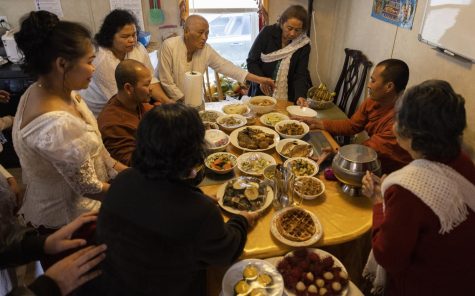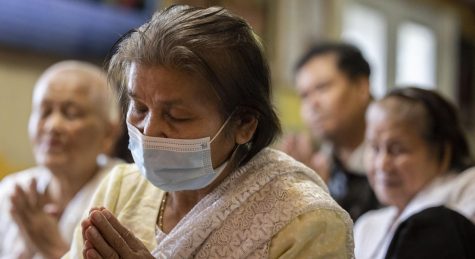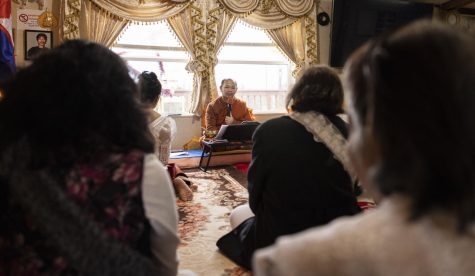A NEW IDENTITY
May 15, 2023
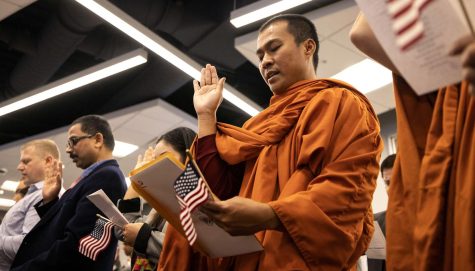
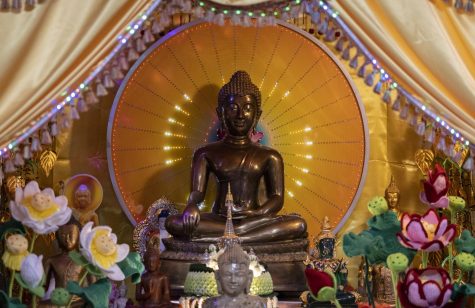
About six miles from the Western Kentucky University campus in Bowling Green lies a small unassuming house that is covered in Khmer script and Buddhist prayer flags. This is Wat Ahram Meinjai, a Theravada Buddhist Temple that rests just outside of the city center. Here, the small, insular Cambodian immigrant community that practices here is able to find a small piece of their culture. Two monks lead the laity here, Sarith Nan and Kheang Socheat, both Cambodian immigrants themselves, giving sermons and blessings in Khmer.
Both Socheat and Nan recently took part in a naturalization ceremony in downtown Louisville. For one of the men, Socheat, the occasion was marked with not only a new identity as a US Citizen, but the decision to leave the monastic lifestyle. After spending most of his life as a monk, this decision was not one made lightly, and with it, the opportunity and risk of entering the job market. His friend, Nan, helped honor Socheat with a ceremony where he was given a great deal of money and other items to bring him luck in his pursuit of civilian life in the US.
This leaves Nan as the only monk left in the monastery. He will, alone, be in charge of all the holiday gatherings by himself and traveling across the country by himself for various religious gatherings. This, however, exemplifies the Buddhist lifestyle –letting go of attachments and finding contentment in solitude and what is. Now it is Nan’s job to ensure that the laypeople who depend upon him for guidance are able to seek the help from him that they need.
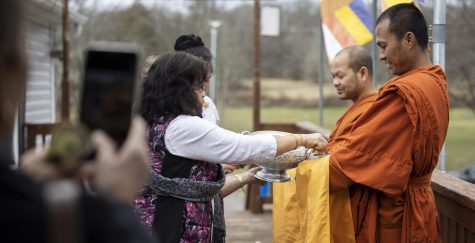
Buddhism in the modern age is primarily made up of three traditions or schools, which are all slightly different from one another. All ultimately have their roots in India through the life and teaching of Siddhartha Gautama, the first Buddha, a prince who left his life behind in order to rid himself and others of worldly suffering. This initial school, the first sangha, is considered today to be what we call Theravada. Theravada is directly derived from the Pali Canon, a text that has survived nearly two-thousand years in its original form. This is the predominant form of Buddhism in Southeast Asia other than in Vietnam, and the state religion of Cambodia.
The laity at Wat Ahram Meinjai is predominantly made up of elderly Khmer people, many of whom are from places such as Louisville or even Memphis, who make the drive to the Bowling Green temple a few times per year for holidays such as Navam Full Moon Poya or Choul Chnam Thmey, the Cambodian/Khmer New Year. This allows them to keep in touch with their customs and culture through worship, language and food. All members are first generation immigrants to the U.S., including the Monks, and as such there is not a huge quantity of English spoken at their services. Wat Ahram represents an important cultural meeting point for this group of immigrants within the U.S.
Sarith Nan and Kheang Socheat act as the primary monks at Wat Ahram Meinjai. They are the primary interface for the laity they serve with both their religious tradition and with their culture in the U.S. They have both been in the U.S. for about seven years taking care of their temple and traveling to other temples many times a year, to Memphis, Tennessee and as far as Los Angeles. They are both soft spoken, reserved and generally content. They are immensely educated about their faith as one would expect, having memorized a great deal of prayers, blessings and rituals. They lead lives of relative solitude, only having large gatherings a few times a year and having a single congregant join them daily to prepare their daily meal, or alms, since they are not allowed to cook their own food.
Navam Full Moon Poya or Magha Puja or Makha Bucha Day is a Buddhist festival that is celebrated on the full moon day of the third lunar month. This holiday represents the first time that the Gautama Buddha held a meeting with 1250 of his disciples, and in a western context, this is quite like All Saints Day for Buddhists. On this day, the temple was abuzz with people, many preparing food for their large communal lunch. Khmer monastic music played over the loudspeaker system set up throughout the inside and outside of the building, and words spoken by the monks often lay over the music through their wireless microphones. People readied themselves for a series of prayers relating to the health and prosperity of the laity and monks. People prepare a huge deal of rice in order to give to the monks as alms, an important custom in its own rights, but especially so during Magha Puja. The laity forms a queue on the front porch and takes turns placing scoops of rice into the alms bowls of each of the monks. This is one of the most common practices along with cooking a large meal for the monks during Magha Puja.
In Southeast Asia, monks will walk around towns to receive alms, which are willingly given to them by residents every day. This is how the monks feed themselves, since they are not supposed to handle money or cook their own food. In the West as in China, this is typically looked down upon, therefore, the laity often donate food and time to cook it, or members of the laity may live at the monastery in order to do menial tasks like cooking and cleaning in order to receive blessings and honor.
Dressed in saffron robes, listening to music on his phone through the sounds of a metal detector and guards talking, Kheang Socheat sits with his fellow monk Sarith Nan waiting for their naturalization ceremony to begin. Before this, they sat in the lobby of the Hyatt hotel in Downtown Louisville, a short walk to the U.S. Customs and Immigration Services Field Office in Louisville. They aren’t dressed like anyone else, and even a lay onlooker would peg them for monks the second they see them. One wouldn’t immediately recognize that Socheat was nervous, with his general expression of contentment painted across his face, giving everyone who makes eye contact a warm smile that can be seen in his eyes. Sitting in the waiting room, Socheat and Nan speak quietly in Khmer, intently watching the other immigrants walk through the security checkpoint. Though he speaks little English, Socheat is about to embark upon one of his biggest journeys. Once he receives his citizenship, he plans to leave the monastic life and the off-the-beaten-path accommodations of Wat Ahram Meinjai. Though he has been a monk most of his 34 years, he feels it is time to move on and start a new life for himself as a civilian and a U.S. citizen.
Many people find themselves as Buddhist monks in many ways. Some come into the life because they were unaccompanied children, or they have fallen upon hard times. Regardless of his actual reason, Socheat has been practicing in Bowling Green for roughly three years. Unsure of what is about to happen next, Socheat and Nan make their way into the adjacent room after filling out documents. Much like their peers in the ceremony they are somber, happy to finally move on with their lives after years of waiting. Short and sweet, the oath ceremony is not flashy, they give their oaths and proceed to be congratulated by the agents in charge. Then it is time for photos beside the flag. Now over, they make their way back to their hotel awaiting transport back to Bowling Green.
Socheat decided after receiving his citizenship that it was his time to experience life outside of being a monk, therefore, he decided to leave the monastic life in pursuit of a secular job. There was a ceremony held in his honor where he was given a great deal of money and other items to bring him luck in his pursuit of the American life that he now has unfettered access to.
With Socheat gone, Nan is now the only monk in the monastery, and he must care for the laity as they need him. This means managing what can be sizable gatherings at holidays by himself, traveling across the country alone and living a much more secluded lifestyle than he has been accustomed to in the past few years. This is, however, exemplary of the Buddhist lifestyle –letting go of attachments and finding contentment in what is. Though he and Socheat were friends, all things must come to an end at some point. Now it is Nan’s job to ensure that the laity that depend upon him for guidance are able to rid their lives of suffering and find peace through life’s highs and lows.
